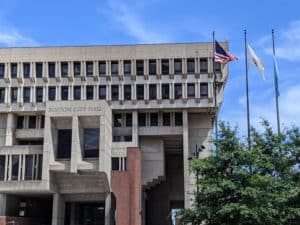Boston Mayor Michelle Wu scored big victories on two of her signature campaign pledges when the Boston City Council this afternoon: rent control and revamping the city’s development agency. But both proposals must now run the gauntlet on Beacon Hill before they can become law.
The mayor had sought city councilors’ backing for separate proposals to institute a citywide 10 percent cap on annual rent increases and recharter the Boston Planning & Development Agency so it could tackle affordability and climate change and combine the two quasi-public legal entities – the Boston Redevelopment Authority and the Economic and Industrial Development Corp. – that former Mayor Marty Walsh had grouped together under the BPDA brand in 2016.
Wu’s rent control proposal would see tenants’ rent increases limited to 6 percent each year, plus an allowance for increases in the local Consumer Price Index. Owner-occupied buildings of six units or less would be exempted, as were buildings up to 15 years old, and landlords would face no cap in rent increases between tenants – measures Wu has said would preserve buildings’ value and enable new construction to easily pencil. The measure would also create a “just cause” eviction standard in the city.
Progressives on the council had threatened to withhold their support unless the rent cap was lowered dramatically, but ultimately all councilors backed the measure, save the body’s two most conservative members, Dorchester’s Frank Baker and Erin Murphy.
“Today the city council delivered a strong message that the city needs. we’re seeing families that are getting pushed out of communities that they grew up in and helped to build,” Wu told reporters after the vote. “I’m so grateful to city councilors for their partnership.”
The mayor described her plan as a type of consumer protection, preventing “price-gouging” in an industry where some landlords – Wu characterized them as a limited number “taking advantage” of the region’s housing shortage – have pushed double-digit rent hikes onto tenants in recent years. Record levels of household formation in 2021 and 2022 helped dramatically drive up demand for apartments in a city routinely ranked as one of the least affordable in the nation. The increases, she said, were destabilizing the city, its schools and its neighborhoods.
One of the state’s largest real estate industry trade groups signaled its consternation at Wednesday’s rent control vote.
“We are disappointed but not totally surprised by the Boston City Council’s vote in support of rent control,” Greater Boston Real Estate Board CEO Greg Vasil said in a statement. “We look forward to promoting pro-housing policies focused on decreasing red tape, additional costs, and regulatory burdens, while increasing production as the path to overcoming the state’s affordability crisis.”
GBREB had already launched a $400,000 mailer and digital ad campaign in the city trying to undermine City Council support for Wu’s proposal, and Vasil told Banker & Tradesman in an interview last week that the group was prepared to take its fight for public opinion to the state level.
“[M]ake no mistake, the fight is just beginning,” Vasil said Wednesday.
Wu pushed back on Vasil’s claims that her rent control proposal will hurt housing production, citing the 15-year exemption for new buildings and saying that administration research showed “the vast majority of good landlords aren’t increasing their rents by 10 percent every year, because they know it’s not a great way to make money. … Most landlords I know and have talked to say they do their best to keep good tenants.”
The council also approved Wu’s home-rule petition to restructure the BPDA and, perhaps most importantly, allow it to use its abilities to grant tax breaks and buy property to advance climate resiliency, equity and affordable housing plans.
“Rather than keep us pinned to a 1950s, 1960s-era focus on getting rid of blight and urban decay, it’s going to be about focusing on challenges that are very relevant to us today,” she said.
Her pledges to streamline the city’s permitting process, rezone the city for more as-of-right development and move the BPDA’s planning functions to a new planning department outside of the quasi-public BPDA are separate and are advancing on different timelines, she said. Administration officials told the City Council recently to not expect a proposal to create a planning department until 2024 due to financial and organizational complexities involved.
“The vision is to have clear rules – that have a higher baseline of what’s expected for affordability and climate resiliency and contributions to the community – but that predictability will allow [developers] to streamline their processes and incorporate that into their proposals” and thus make building cheaper and easier, she said.
Both proposals now need state legislators to approve them – traditionally an area where Boston mayors have seen mixed success – before they can become law.
Wu said she believes there is strong support for her BPDA reorganization plan on Beacon Hill, but the fate of her rent control proposal is less clear. Repeated polls have shown around two-thirds of Bay Staters support the idea of local-option rent control, and Gov. Maura Healey has indicated she might support local-option rent control plans like Wu’s. However, officials in Somerville and Cambridge recently indicated they plan to pursue their own rent control measures, and real estate groups have warned that some Boston suburbs could turn to highly restrictive rent control regimes as a way to deter new multifamily development that would otherwise be built under the new MBTA Communities transit-oriented zoning law.







